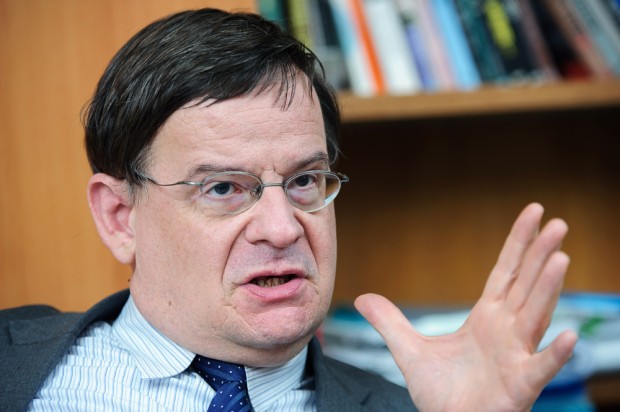NORTH KOREA is a tiny dictatorship with a bankrupt economy, but its leaders are remarkably adept at manipulating global public opinion. In recent weeks, we have been exposed to yet another brilliant example of their skill.
Scores of foreign journalists have been dispatched to Seoul to report on the growing tensions between the two Koreas and the possibility of war. Upon arrival, though, it is difficult for them to find any South Koreans who are panic-stricken. In fact, most people in Seoul don’t care about the North’s belligerent statements: the farther one is from the Korean Peninsula, the more one will find people worried about the recent developments here.
The average South Korean’s calm indifference is understandable: he or she has been through similar “crises” many times. By now South Koreans understand Pyongyang’s logic and know North Korea is highly unlikely to make good on its gothic threats.
People who talk about an imminent possibility of war seldom pose this question: What would North Korea’s leadership get from unleashing a war that they are likely to lose in weeks, if not days? Even if they managed to strike Japan, the United States or South Korea with nuclear weapons — a big if, given that they do not have a reliable delivery system — they could not save themselves from ultimate defeat. On the contrary, the use of nuclear or other terror weapons would be certain to invite overwhelming retaliation, delivering North Korea’s decision makers to a fiery oblivion.
 |
| Andrei Lankov |
In fact, there are no good reasons to think that Kim Jong-un, North Korea’s young dictator, would want to commit suicide; he is known for his love of basketball, pizza and other pleasures of being alive. The same logic applies to his advisers, old survivors in the byzantine world of North Korean politics who love expensive cars and good brandy.
Moreover, there is almost nothing particularly unusual in the recent developments. In the last two decades, North Korea has on various occasions conducted highly provocative missile and nuclear tests and promised to turn Seoul into a sea of fire. Now it has declared its withdrawal from the 1953 armistice agreement that ended fighting in the Korean War but not the war itself. It has denounced American and South Korean military exercises as an act of war. And on Tuesday, North Korea told foreigners in the South to look for shelter or consider evacuating because the Korean Peninsula could soon be engulfed in nuclear war. This time, the tune is being played louder, but that is the only real change.
A closer look at North Korean history reveals what Pyongyang’s leaders really want their near-farcical belligerence to achieve — a reminder to the world that North Korea exists, and an impression abroad that its leaders are irrational and unpredictable. The scary impressions are important to North Korea because for the last two decades its policy has been, above all, a brilliant exercise in diplomatic blackmail. And blackmail usually works better when the practitioners are seen as irrational and unpredictable.
Put bluntly, North Korea’s government hopes to squeeze more aid from the outside world. Of late, it has become very dependent on Chinese aid, and it wants other sponsors as well.
The leaders in Pyongyang read their history books. In 1994, after a year of tension over North Korea’s efforts to acquire nuclear weapons, the United States agreed to provide North Korea with oil shipments and light water reactors in exchange for the North’s promise to halt its weapons program. Then, in 2002, a clandestine North Korean uranium enrichment program was unmasked, and for the next four years North Korea could not get much American aid. But after it conducted a nuclear test in October 2006, the United States promised significant concessions, in hopes that new negotiations could halt the North’s weapons program after all. They did not.
If history is any guide, in a few weeks’ time things will calm down. North Korea’s media will tell its people that the might of the People’s Army and the strategic genius of their new young leader made the terrified American imperialists cancel their plans to invade the North. Meanwhile, North Korea’s diplomats will approach their international counterparts and start probing for aid and political concessions.
In other words, it is business as usual on the Korean Peninsula. Perhaps, when the atmosphere cools down, an argument can be made for giving North Korea’s leaders some of the assistance they want, if they are willing to make concessions of their own.
But it does not make sense to credulously take their fake belligerence at face value and give them the attention they want now. It would be better if people in Washington and New York took a lesson from the people of Seoul.













